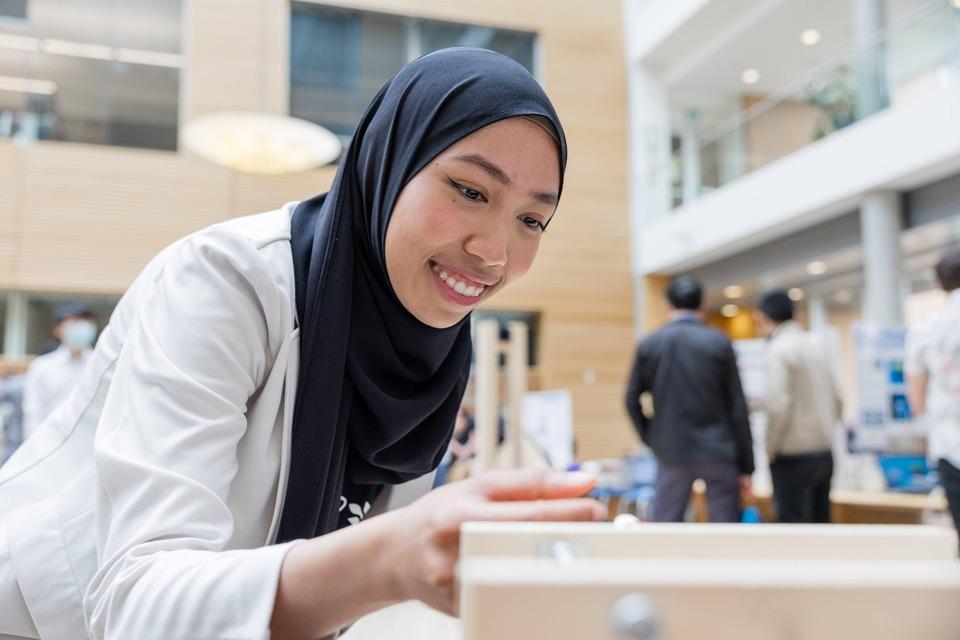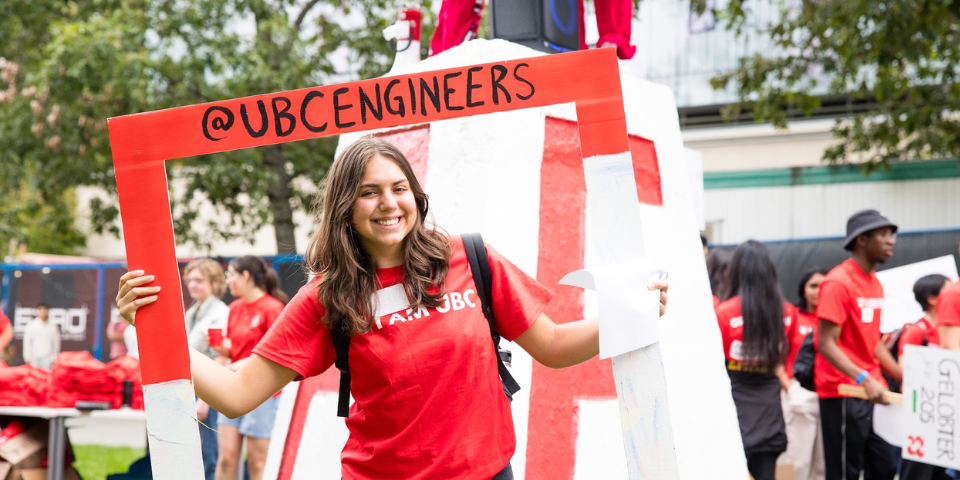
Chemical engineers are universal engineers, creatively and innovatively solving global energy, water and environmental issues while transforming raw materials into products that society depends on.
Fusing the physical and chemical sciences with mathematics, process engineering, design and economics, a degree in Chemical Engineering opens doors to diverse opportunities, like clean-energy generation, nanotechnology and new material generation.
At UBC, you’ll learn how to design, build, and operate the manufacturing and industrial processes that are used to create the products and services that are essential to everyday life. From energy, food and fertilizers to pharmaceuticals, plastics and paper, to the products of tomorrow, chemical engineers create innovative ways of removing greenhouse gases from the atmosphere to cool our planet, new methods of growing food indoors, novel approaches for making fabrics and textiles from forest waste and more. Our students excel thanks to instruction from world-class researchers, hands-on experience in learning labs, industrial site visits, and connecting with practising engineers and industry partners. We foster a learning environment of inclusiveness, teamwork and creative thinking.
Play a role in research; engineer safer, greener product formulations and processes; and help discover and develop new ways to minimize society’s environmental footprint, while maximizing value in the real world.
Vancouver Campus
Learn more at You UBC's program page or visit us at chbe.ubc.ca.
Why Study This Program
Chemical Engineering graduates are in demand in a wide variety of different fields. These can include process control, chemical and electrochemical processing in resource-focused fields (such as oil & gas, mining, pulp & paper), carbon dioxide capture and storage, clean energy, renewable energy, food processing, sustainability, and pollution prevention and reduction in industrial processes. Chemical engineers can integrate environmental sustainability into processes leading to the development of zero-emission fuels, biodegradable materials to replace plastics, drought-resistant crops, and vertical farms. The design, development, construction, and operation of these processes are central to the field of chemical engineering.
The Chemical and Biological Engineering building houses extensive custom research labs. The Clean Energy Research Centre is also a part of the Chemical and Biological Engineering Department.
The department collaborates with research in many multidisciplinary Research Centres at UBC including:
- Pulp and Paper Centre (PPC)
- Michael Smith Laboratories (MSL)
- Centre for Blood Research (CBR)
- Bioenergy Research and Demonstration Facility (BRDF)
- Advanced Materials Processing Laboratory (AMPEL)
Courses & Specializations
Students will first complete a foundational first year of engineering and then take specialized courses beginning in second year, once they are placed into their engineering discipline. Here is a sample of the courses Chemical Engineering students take in each year of study:
| Year 2 | |
|---|---|
| CHBE_V 201 | Integrated Technical Communication |
| CHBE_V 241 | Material and Energy Balances |
| CHBE_V 264 | Chemical and Biological Engineering Laboratory |
| MATH_V 256 | Differential Equations |
| Year 3 | |
|---|---|
| CHBE_V 376 | Computer Flowsheeting |
| CHBE_V 366 | Chemical Engineering Laboratory |
| APSC_V 278 | Engineering Materials |
| CHBE_V 356 | Process Dynamics and Control |
| Year 4 | |
|---|---|
| CHBE_V 454 | Chemical Process and Product Design |
| CHBE_V 474 | Chemical and Biological Engineering Laboratory |
| CHBE_V 459 | Chemical and Biological Engineering Economics |
| CHBE_V 456 | Heterogenous Catalysis and Advanced Reactor Design |
For a more in-depth look at the curriculum, please consult the Academic Calendar and course descriptions.
Careers
With a mean base salary of $110,790 (source) and an expected employment growth rate of 1.3% over the next 5 years (source), graduates of Chemical Engineering are well equipped to pursue careers in manufacturing and processing industries, consulting firms, government, and research and educational institutions (source). Common career titles (source) for Chemical Engineering graduates include: chemical engineer, chemical process engineer, chemical project engineer, adhesives engineer, design and development chemical engineer, electrochemical engineer, environmental chemical engineer, explosives engineer, fuels engineer, industrial hygiene engineer, petrochemical engineer, pipeline transport engineer, plastics engineer, polymer engineer, pulp and paper engineer, refinery engineer, waste treatment engineer and more.
Employers
Both current students and graduates are able to work for a wide range of employers. Some of the biggest employers of UBC Chemical Engineering students over the past several years include Shell Canada LTD, Canfor Corporation, FortisBC, and Syncrude.
Alumni
Design Teams & Clubs
Design Teams
There are over 30 Engineering Design Teams at UBC. Joining an engineering design team is an excellent opportunity for students from all disciplines to collaborate on a wide variety of design projects and gain relevant teamwork, leadership, and technical skills transferrable to future careers. Design teams related to Chemical and Biological Engineering include:
UBC's Engineering Design Teams
Clubs
There are many ways engineering students can get involved, including joining clubs relevant to their discipline. Clubs relevant to Chemical and Biological Engineering include:
Research
- Biotechnology and Biomedical Engineering:
- The resources available to the department and UBC allows our student researchers to develop a systems-level understanding of the complex interplay between the genome, proteome and metabolome, and to investigate biological processes at unprecedented rates and scales. Many of our current researchers’ focus include bioenergy, biomanufacturing, pharmaceutical synthesis, environmental remediation, biomedical engineering, tissue engineering and synthetic biology.
- The resources available to the department and UBC allows our student researchers to develop a systems-level understanding of the complex interplay between the genome, proteome and metabolome, and to investigate biological processes at unprecedented rates and scales. Many of our current researchers’ focus include bioenergy, biomanufacturing, pharmaceutical synthesis, environmental remediation, biomedical engineering, tissue engineering and synthetic biology.
- Environmental Engineering:
- Department researchers are working on innovative ways to re-mediate polluted sites, to reduce and prevent pollution, to develop cleaner and more sustainable energy sources, and to treat water. Some areas of focus includes: Bio-remediation of contaminated industrial sites, carbon dioxide mitigation, capture and storage, clean and sustainable energy(bio-fuels, biomass processing and pre-processing, fuel cells and hydrogen production, gasification and syn-gas conversion, microbial technology for bio-methane and bio-hydrogen generation), air pollution control, water pollution control, solid waste management for resource recovery, water treatment technologies to provide clean drinking water.
- Chemical Process Engineering:
- With applications to everyday products and processes relevant to industry, researchers work to manufacture products that are safe, economically viable and have minimum impact on the local and global environment. Some areas of focus include: catalytic and thermal processes for the extraction, upgrade and processing of fossil fuels energy, process control and optimization, carbon dioxide capture, storage and utilization, multiphase and particulate processes, rheology and polymer processing, clathrate or gas hydrates and flow assurance in hydrocarbon processing and production facilities
- Energy and Materials:
- Energy supply and security are important considerations to work towards a more sustainable future. Current research involves the reduction of greenhouse gases and urban pollution, with areas of focus including the use of renewables (biomass and solar), cleaner methods of using non-renewable energy, energy conversion using fuel cells and combustion processes, energy storage with fuels such as hydrogen and methane, treatment of energy related emissions (carbon dioxide capture and removal), waste water treatment, energy materials designed and fabricated from the nanoscale to the macroscopic scale (heterogeneous catalysis).
- Engineering Education:
- Our team of world-class educators are leaders in the development of modern engineering education programs and novel instructional resources that provide students with versatile and powerful skillsets that allow them to tackle humanity’s greatest challenges, train them to join cutting-edge industries, and make a difference in the world around us. Expertise in the science of teaching and learning is leveraged to create world-leading, engaging, and effective learning experience for our students, and give them the tools to succeed wherever their careers take them.
Minors and Dual Degrees
Engineering students are able to complement their studies with 5 Minors or a Dual Degree with Arts. Students interested in a minor can apply to their chosen option in their third year of study. A minor or dual degree will likely extend your degree past 5 years.
Co-op
Participation in the Science Co-op Education program gives students the opportunity to gain up to 16 months of paid relevant work experience during their degree. This experience provides an excellent opportunity for students to explore different industries, apply their studies to the working world, and create connections with future employers. Participation is optional and students apply to join Co-op in their second year of study.
International Experiences
Students can embark on an unforgettable experience abroad while earning credits towards their engineering studies. Opportunities include the Coordinated International Experience (CIE) exchange program, the Go Global exchange program, and the Global Engineering Leadership courses. The CIE program is customized for Applied Science students and features 18 international partner institutions across 3 regions. All of the international experiences allow students to build an international network of peers, professors, and potential employers.










